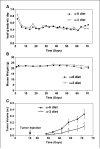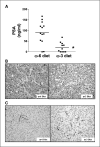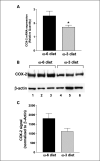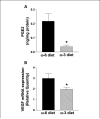Effect of altering dietary omega-6/omega-3 fatty acid ratios on prostate cancer membrane composition, cyclooxygenase-2, and prostaglandin E2
- PMID: 16899616
- PMCID: PMC3410648
- DOI: 10.1158/1078-0432.CCR-06-0459
Effect of altering dietary omega-6/omega-3 fatty acid ratios on prostate cancer membrane composition, cyclooxygenase-2, and prostaglandin E2
Abstract
Purpose: To determine whether altering the dietary content of omega-6 (n-6) and omega-3 (n-3) polyunsaturated fatty acids affects the growth of androgen-sensitive prostate cancer xenografts, tumor membrane fatty acid composition, and tumor cyclooxygenase-2 and prostaglandin E(2) (PGE(2)) levels.
Experimental design: Individually caged male severe combined immunodeficiency mice were fed isocaloric 20% kcal fat diets with the fat derived either primarily from n-6 fatty acids (n-6 group) or with the fat consisting of n-6 and n-3 fatty acids in a ratio of 1:1 (n-3 group), and injected s.c. with Los Angeles Prostate Cancer 4 (LAPC-4) cells. Tumor volumes and mouse weights were measured weekly, caloric intake was measured 3 days per week, and tumors and serum were harvested at 8 weeks postinjection.
Results: Tumor growth rates, final tumor volumes, and serum prostate-specific antigen levels were reduced in the n-3 group relative to the n-6 group. The n-3 group tumors had decreased proliferation (Ki67 staining) and increased apoptosis (terminal nucleotidyl transferase-mediated nick end labeling staining). In vitro proliferation of LAPC-4 cells in medium containing n-3 group serum was reduced by 22% relative to LAPC-4 cells cultured in medium containing serum from the n-6 group. The n-6/n-3 fatty acid ratios in serum and tumor membranes were lower in the n-3 group relative to the n-6 group. In addition, n-3 group tumors had decreased cyclooxygenase-2 protein and mRNA levels, an 83% reduction in PGE(2) levels, and decreased vascular endothelial growth factor expression.
Conclusion: These results provide a sound basis for clinical trials evaluating the effect of dietary n-3 fatty acids from fish oil on tumor PGE(2) and membrane fatty acid composition, and serum and tumor biomarkers of progression in men with prostate cancer.
Figures





References
-
- Rose DP, Connolly JM. Effects of fatty acids and eicosanoid synthesis inhibitors on the growth of two human prostate cancer cell lines. Prostate. 1991;18:243–54. - PubMed
-
- Pandalai PK, Pilat MJ, Yamazaki K, Naik H, Pienta KJ. The effects of omega-3 and omega-6 fatty acids on in vitro prostate cancer growth. Anticancer Res. 1996;16:815–20. - PubMed
-
- Karmali RA, Reichel P, Cohen LA, et al. The effects of dietary omega-3 fatty acids on the DU-145 transplantable human prostatic tumor. Anticancer Res. 1987;7:1173–9. - PubMed
-
- Rose DP, Cohen LA. Effects of dietary menhaden oil and retinyl acetate on the growth of DU 145 human prostatic adenocarcinoma cells transplanted into athymic nude mice. Carcinogenesis. 1988;9:603–5. - PubMed
-
- Chung BH, Mitchell SH, Zhang JS, Young CY. Effects of docosahexaenoic acid and eicosapentaenoic acid on androgen-mediated cell growth and gene expression in LNCaP prostate cancer cells. Carcinogenesis. 2001;22:1201–6. - PubMed
Publication types
MeSH terms
Substances
Grants and funding
LinkOut - more resources
Full Text Sources
Other Literature Sources
Medical
Research Materials

